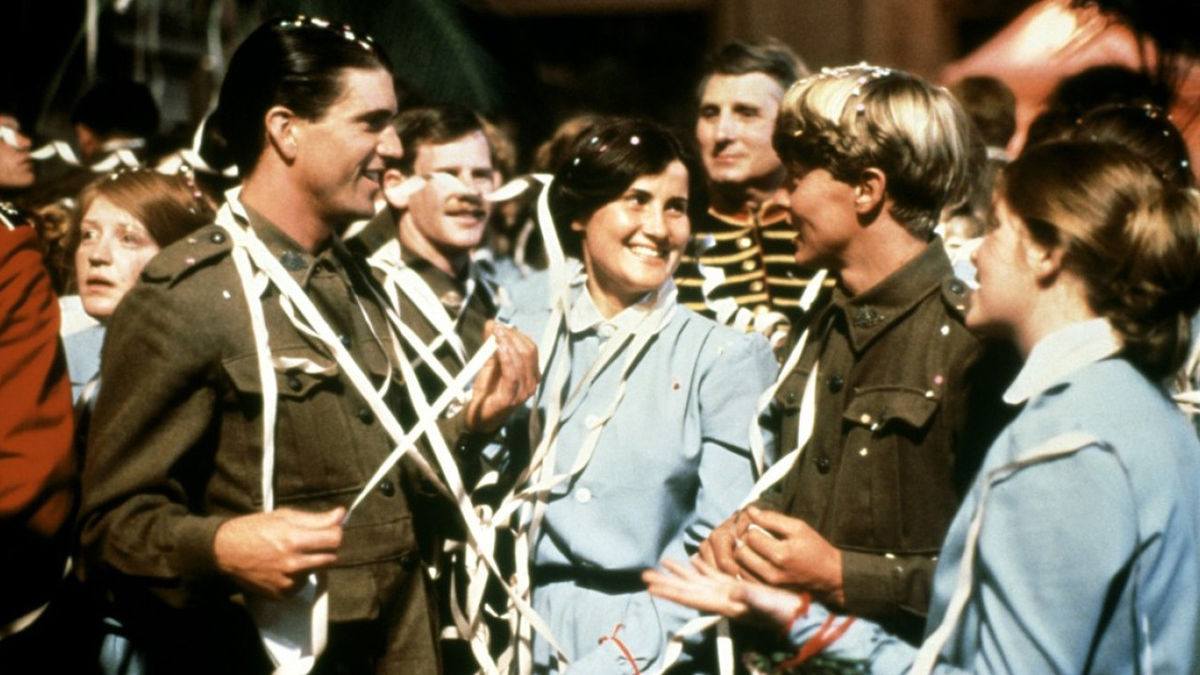Gallipoli (1981)

“Gallipoli,” directed by Peter Weir and released in 1981, is a poignant and powerful war film that explores themes of friendship, heroism, and the devastating effects of conflict. Set against the backdrop of the Gallipoli Campaign during World War I, the film provides a deeply moving portrayal of the experiences of Australian soldiers who fought in one of the war’s most tragic battles. With its strong performances, evocative cinematography, and resonant narrative, “Gallipoli” stands as a significant contribution to the genre of war films.
The story centers on two young Australian soldiers, Frank Dunne, played by Mel Gibson, and Archy Hamilton, portrayed by Mark Lee. The film follows their journey from their rural Australian hometown to the front lines of the Gallipoli Peninsula, a critical location in the campaign fought between the Allied forces and the Ottoman Empire. The narrative begins with the friendship between Frank and Archy, whose youthful enthusiasm and sense of adventure lead them to enlist in the military and join the fight in Europe.
“Gallipoli” is notable for its emphasis on the personal experiences of its characters rather than focusing solely on the broader military strategy and historical context. The film delves into the bond between Frank and Archy, highlighting their camaraderie, dreams, and the stark contrasts between their lives before and after the war. Their journey from enlistment to the battlefront underscores their transition from innocent idealism to the harsh realities of warfare.

The film’s portrayal of the Gallipoli Campaign is both detailed and respectful. Peter Weir meticulously reconstructs the historical context of the battle, incorporating authentic elements of the military and social environment of the time. The Gallipoli Campaign, which took place between April and December 1915, was a significant and tragic episode of World War I, marked by heavy casualties and strategic failure for the Allied forces. “Gallipoli” captures the harrowing conditions faced by the soldiers, including the grueling terrain, the relentless combat, and the emotional toll of warfare.
The cinematography in “Gallipoli,” by Russell Boyd, is a crucial element in conveying the film’s emotional depth. The expansive Australian landscapes and the contrasting, rugged terrain of Gallipoli are depicted with striking visuals that enhance the film’s realism and immersion. Boyd’s use of wide shots and intimate close-ups creates a vivid contrast between the beauty of the Australian countryside and the harshness of the battlefield.

The performances by Mel Gibson and Mark Lee are central to the film’s impact. Mel Gibson’s portrayal of Frank Dunne is characterized by a mix of charisma, vulnerability, and resolve. Gibson captures the complexity of Frank’s character, from his initial reluctance to join the war to his eventual acceptance of the harsh realities of combat. Mark Lee’s performance as Archy Hamilton complements Gibson’s portrayal, depicting Archy as a spirited and idealistic young man whose determination and bravery are tested by the brutalities of war.
“Gallipoli” is also notable for its exploration of the theme of sacrifice. The film examines the cost of war not only in terms of physical casualties but also in the emotional and psychological impact on individuals and their families. The bond between Frank and Archy, as well as their interactions with other soldiers, highlights the personal sacrifices made in the name of duty and patriotism. The film’s climax, which depicts the tragic outcome of the Gallipoli campaign, serves as a powerful and emotional commentary on the futility and human cost of war.

The musical score by Bruce Smeaton adds another layer of emotional resonance to the film. The evocative and somber soundtrack underscores the film’s themes of loss and sacrifice, enhancing the emotional impact of the narrative. Smeaton’s composition, combined with the film’s visuals and performances, creates a deeply affecting and memorable cinematic experience.
In conclusion, “Gallipoli” is a masterful film that offers a heartfelt and poignant portrayal of the experiences of soldiers during World War I. Through its focus on the personal stories of Frank Dunne and Archy Hamilton, the film provides a moving exploration of friendship, sacrifice, and the harsh realities of war. Peter Weir’s direction, along with the strong performances by Mel Gibson and Mark Lee, and the evocative cinematography and score, contribute to a powerful and lasting cinematic experience. “Gallipoli” stands as a testament to the courage and resilience of those who served in one of the war’s most tragic campaigns, and it continues to resonate with audiences as a profound reflection on the cost of conflict and the enduring spirit of camaraderie.











